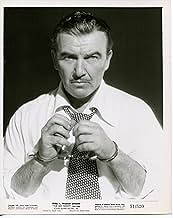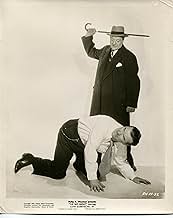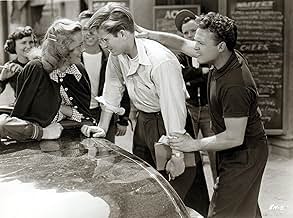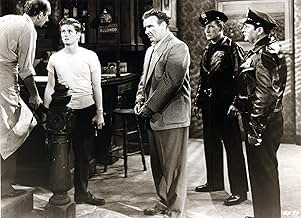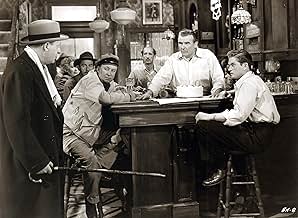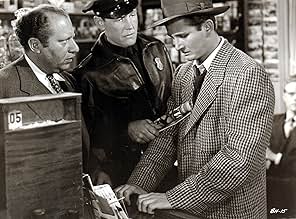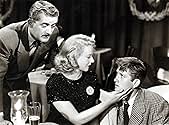IMDb RATING
6.3/10
1.2K
YOUR RATING
A teenager comes of age while seeking revenge on the man who beat up his father.A teenager comes of age while seeking revenge on the man who beat up his father.A teenager comes of age while seeking revenge on the man who beat up his father.
John Drew Barrymore
- George La Main
- (as John Barrymore Jr.)
Howland Chamberlain
- Flanagan
- (as Howland Chamberlin)
Emile Meyer
- Peckinpaugh
- (as Emil Meyer)
Mauri Leighton
- Terry Angelus
- (as Mauri Lynn)
Robert Aldrich
- Ringsider at Fight
- (uncredited)
Walter Bacon
- Boxing Match Spectator
- (uncredited)
Benjie Bancroft
- Bar Patron
- (uncredited)
Robert Bice
- Taxi Driver
- (uncredited)
Willie Bloom
- Boxing Match Spectator
- (uncredited)
Chet Brandenburg
- Boxing Match Spectator
- (uncredited)
Lane Chandler
- Printer
- (uncredited)
Edmund Cobb
- Cop
- (uncredited)
Featured reviews
The tale is based on an obscure novel called The Dreadful Summit by author/screenplay-writer Stanley Ellin. The script for the film appears to be a jumbled mess, but each segment has great independent value that is the result of an intelligent Losey touch. The lovely remarkable scenes are the following:
A. Young bespectacled George bullied by friend to kiss a girl whom he likes B. A birthday cake with lighted candles given by his father that George is unable to blow out in full, One remains lit ominously. The cake serves as a reminder that the entire film deals with happenings of a single day. At the last scene the cake reappears to remind us of it. C. What appears to be real is proved unreal time and time again. D. The left-sympathizing Losey and friends made the film with a cleverness missing in other films of the day. Closure of the bars's curtains by the assistant to George's dad is a symbolic in an odd way. E. The small bitter role given to the enigmatic "2nd Mrs Citizen Kane" (Dorothy Comingore) as Julie Rostina, after she was hounded out in real life by Randolph Hearst and then the awful McCarthy witch hunt of alleged communists in Hollywood that followed states a story within a story. It is sad the way she died in real life. She had so much potential as an actress. F. The honest appreciation of beauty and talent of a black singer by George leads to so much bitterness of color-based prejudices. Losey adds a black poodle in chains in that scene. G The two kisses of George in the film are so different (the opening sequence and later one with Marion)
These sequences are all wonderful, though the film never comes together. Yet it is a notable statement of undying love by a husband for his wayward wife and also of a motherless young man trying to love women and eventually grow up to be a good husband.
A. Young bespectacled George bullied by friend to kiss a girl whom he likes B. A birthday cake with lighted candles given by his father that George is unable to blow out in full, One remains lit ominously. The cake serves as a reminder that the entire film deals with happenings of a single day. At the last scene the cake reappears to remind us of it. C. What appears to be real is proved unreal time and time again. D. The left-sympathizing Losey and friends made the film with a cleverness missing in other films of the day. Closure of the bars's curtains by the assistant to George's dad is a symbolic in an odd way. E. The small bitter role given to the enigmatic "2nd Mrs Citizen Kane" (Dorothy Comingore) as Julie Rostina, after she was hounded out in real life by Randolph Hearst and then the awful McCarthy witch hunt of alleged communists in Hollywood that followed states a story within a story. It is sad the way she died in real life. She had so much potential as an actress. F. The honest appreciation of beauty and talent of a black singer by George leads to so much bitterness of color-based prejudices. Losey adds a black poodle in chains in that scene. G The two kisses of George in the film are so different (the opening sequence and later one with Marion)
These sequences are all wonderful, though the film never comes together. Yet it is a notable statement of undying love by a husband for his wayward wife and also of a motherless young man trying to love women and eventually grow up to be a good husband.
The story here is revenge, more real-life based, a 1950's version of the crime of passion. A teenager's good-hearted father is beaten to a pulp by a gangster, so the kid invades the streets to get some payback. The father's not worried about the floor-wiping, which leads to a mystery behind the teen's mother, who skipped out on the family long ago, and a woman the father knows who has committed suicide.
Seeing this film, there's not much in terms of plot, but there are some notable scenes, particularly when the kid hears a beautiful night-club singer, becomes entranced, gets a chance to meet her on the street, and tells her how beautiful she is. Even though she's, you know,
black. The pain in the singer's face rends the poor kid, who was transported by her voice, but can't get beyond her skin color.
This film also has one of THE great lines ever in any film noir or any movie period, at least concerning the tragedy between a man and a woman, when there is love involved. There are no words more powerful or poignant, especially for a man who loves a woman beyond reason, who knows he has lost the love of his life. Unable to move on, to love or marry another woman after that one woman has destroyed him, and in fact still very much in love with his destroyer,
Preston Foster tells his son, "Sometimes a man loves one woman in the whole world. If she turns out to be the wrong one, well...that's just tough." Truly, the heart of noir is not blackness, but the white-hot scars of passion.
Seeing this film, there's not much in terms of plot, but there are some notable scenes, particularly when the kid hears a beautiful night-club singer, becomes entranced, gets a chance to meet her on the street, and tells her how beautiful she is. Even though she's, you know,
black. The pain in the singer's face rends the poor kid, who was transported by her voice, but can't get beyond her skin color.
This film also has one of THE great lines ever in any film noir or any movie period, at least concerning the tragedy between a man and a woman, when there is love involved. There are no words more powerful or poignant, especially for a man who loves a woman beyond reason, who knows he has lost the love of his life. Unable to move on, to love or marry another woman after that one woman has destroyed him, and in fact still very much in love with his destroyer,
Preston Foster tells his son, "Sometimes a man loves one woman in the whole world. If she turns out to be the wrong one, well...that's just tough." Truly, the heart of noir is not blackness, but the white-hot scars of passion.
Joseph Losey on his nightmare years on Hollywood accused of anti-American activities that famous black list, here made a small Noir picture starring the younger Barrymore's clan John Barrymore Jr, playing a teenager who testified his beloved father Andy La Main (Preston Foster) get beat up upon eyes of many customers without any defensive posture, it pulls out entrains of soul, seek revenge through the night against a notorious sportswriter Al Judge (Howard St. John) wherever he goes all night long, firstly on a box match where he bumps into a friendly guy Dr. Lloyd Cooper (Philip Bourneuf) who'll buy an extra ticket, stolen by a corrupt cop aftermaths, he is introduces for a Dr. Lloyd's lover Marion (Joan Loring) at night club, meanwhile looking around Al Judge's whereabouts.
The young George La Main stalking Al Judge in every place, this journey actually is his prove of fire, due in that night George will see how the anger sometimes is silly over a so complex matter regarding his father's past happenings, he'll meets a gorgeous black singer girl, where the society barrier split apart, also on Marion's apartment he randomly faces a young girl whom cares about him, depressing and haunted George seeks Al Judge at your own apartment aiming for clear up and finally got his so awaited revenge, however the real reason will baffled him when the perpetrator claiming a fair reason.
Aside the fine premise the outcome is faraway to be suitable, a lame screenplay lost a fair opportunity to allowed a convincing ending, what a waste, in other hand there are plenty of fine sequences at long night in several places, as the fabulous one at toilet, also on the box match when George watching Al Judge thru binocs one second later Al disappears from the sight, fantastic sequences worthwhile a look in this early Losey.
Thanks for reading
Resume:
First watch: 2023 / How many: 1 / Source: DVD / Rating: 7.
The young George La Main stalking Al Judge in every place, this journey actually is his prove of fire, due in that night George will see how the anger sometimes is silly over a so complex matter regarding his father's past happenings, he'll meets a gorgeous black singer girl, where the society barrier split apart, also on Marion's apartment he randomly faces a young girl whom cares about him, depressing and haunted George seeks Al Judge at your own apartment aiming for clear up and finally got his so awaited revenge, however the real reason will baffled him when the perpetrator claiming a fair reason.
Aside the fine premise the outcome is faraway to be suitable, a lame screenplay lost a fair opportunity to allowed a convincing ending, what a waste, in other hand there are plenty of fine sequences at long night in several places, as the fabulous one at toilet, also on the box match when George watching Al Judge thru binocs one second later Al disappears from the sight, fantastic sequences worthwhile a look in this early Losey.
Thanks for reading
Resume:
First watch: 2023 / How many: 1 / Source: DVD / Rating: 7.
Uneven film that at times seems to drift. Still, there are genuinely compelling moments, as when burly dad LeMaine (Foster, in a fine performance) meekly submits to a brutal cane lashing that had me cringing. Why he's submitting remains a puzzle until the end. Because of the beating, Dad's insecure son George (Barrymore Jr.) spends the movie's remainder trying to avenge his father.
Beneath the revenge narrative, however, is really a rite-of-passage story. For example, in a not very believable opening, a cringing George is pounded in humiliating fashion by his teenage peers. We're given no explanation, nor does actor Barrymore physically resemble an easy mark. It's not a promising beginning. Then, in a much more persuasive scene, Dad casts a slightly disapproving eye over his nervous son's birthday cake (symbolic of the story). So the kid must prove himself not only to Dad, but to himself.
It's not a tight screenplay. Events more or less simply follow one another, tied together by the theme of vengeance. Happily, however, the narrative doesn't drag. Actor Barrymore Jr. had a rather brief career despite the pedigree. One thing for sure, he's certainly different looking. With a mop of unruly hair and slightly crooked mouth, he's no glamor boy. Nonetheless, his looks are perfect for the role, such that, when he dons a sport coat and hat, he still looks like a kid trying to take a big step up. All in all, the young actor does pretty well in the kind of difficult role that would later go to James Dean. I also like a de-glamorized Joan Lorring, who's a good match for him. My one real complaint is the way Al Judge (St. John) is written. His behavior is so crude and ugly, it's hard thinking of him as a respected sports writer. A racketeer would have been more credible and easier, so the scriptwriters must have had a reason.
Then too, the screenwriters, Butler and Lardner Jr., along with director Losey, were all blacklisted during Hollywood's commie hunting period. I suspect it was their leftist leanings that are responsible for one of the film's most arresting sequences. George goes to a nightclub where a drop-dead beautiful black songstress (Mauri Lynn) entertains. Afterward, he encounters her outside and is compelled to compliment her looks and talent. She glows at the flattering remark. Trouble is his heartfelt momentum carries over to the unspoken qualification "for a Negro woman". She grasps the unfortunate hanging-in-the-air racial reference, and is reminded of her not-fully-equal status. Thus, disappointment clouds her former glow. It's a beautifully played moment and quite powerful in emotional impact. I wonder what happened to that fine actress.
Anyway, the movie does have a number of effective noir touches, especially George's twilight escape through LA's towering industrial district. It's a mysterious world so much larger than himself. All in all, the film is oddly memorable, thanks, I think, to Barrymore's unusual presence. I know I sought it out on DVD, lo, so many years after having first seen it in a theatre.
(In passing—the burly guy sitting next to Barrymore and Bourneuf ringside at the fights is Robert Aldrich, the great director of such classics as Kiss Me Deadly {1955} and Attack {1956}.)
Beneath the revenge narrative, however, is really a rite-of-passage story. For example, in a not very believable opening, a cringing George is pounded in humiliating fashion by his teenage peers. We're given no explanation, nor does actor Barrymore physically resemble an easy mark. It's not a promising beginning. Then, in a much more persuasive scene, Dad casts a slightly disapproving eye over his nervous son's birthday cake (symbolic of the story). So the kid must prove himself not only to Dad, but to himself.
It's not a tight screenplay. Events more or less simply follow one another, tied together by the theme of vengeance. Happily, however, the narrative doesn't drag. Actor Barrymore Jr. had a rather brief career despite the pedigree. One thing for sure, he's certainly different looking. With a mop of unruly hair and slightly crooked mouth, he's no glamor boy. Nonetheless, his looks are perfect for the role, such that, when he dons a sport coat and hat, he still looks like a kid trying to take a big step up. All in all, the young actor does pretty well in the kind of difficult role that would later go to James Dean. I also like a de-glamorized Joan Lorring, who's a good match for him. My one real complaint is the way Al Judge (St. John) is written. His behavior is so crude and ugly, it's hard thinking of him as a respected sports writer. A racketeer would have been more credible and easier, so the scriptwriters must have had a reason.
Then too, the screenwriters, Butler and Lardner Jr., along with director Losey, were all blacklisted during Hollywood's commie hunting period. I suspect it was their leftist leanings that are responsible for one of the film's most arresting sequences. George goes to a nightclub where a drop-dead beautiful black songstress (Mauri Lynn) entertains. Afterward, he encounters her outside and is compelled to compliment her looks and talent. She glows at the flattering remark. Trouble is his heartfelt momentum carries over to the unspoken qualification "for a Negro woman". She grasps the unfortunate hanging-in-the-air racial reference, and is reminded of her not-fully-equal status. Thus, disappointment clouds her former glow. It's a beautifully played moment and quite powerful in emotional impact. I wonder what happened to that fine actress.
Anyway, the movie does have a number of effective noir touches, especially George's twilight escape through LA's towering industrial district. It's a mysterious world so much larger than himself. All in all, the film is oddly memorable, thanks, I think, to Barrymore's unusual presence. I know I sought it out on DVD, lo, so many years after having first seen it in a theatre.
(In passing—the burly guy sitting next to Barrymore and Bourneuf ringside at the fights is Robert Aldrich, the great director of such classics as Kiss Me Deadly {1955} and Attack {1956}.)
John Drew Barrymore Jr. Enters the "Family Tradition" and Dives Deeply and Emerges with an Over-the-Top Hot Performance that Desperately Demands a Non-Nepo Response.
Awkward, Nervously Angst-Ridden, He Performs Like His Life Depended-On-It, Trying Maybe a Beat too Hard.
But Director Losey Let Him, and other Things Here Go Un-Checked.
Relying on the Dark Underbelly of the City its Megalopolis Tendency to Erode and Crush the "Little People", that by Fate, Inhabit the Arteries of the "Concrete Jungle" Clinging to Every Vine and Crevice for Survival.
The Movie seems a Bit-Rushed (anticipating Losey's life in forced-flux), compared to Other more Solid Cinema Unleashed by the Cynical, Left-Leaning "Auteur" that was Victimized by the "Red-Scare" and an Out-of-Control Political Corruption that Failed to See the Unconstitutional Error of Their Ways in Real Time.
The Film, in 1951 was Made when Film-Noir itself was the Victim of a "System" on the Warpath to Sanitize anything in America that Looked Like a Trend Away from the Idealistic, Road-Map Created for a Guide of What Was and What Was Not Acceptable to the Clergy, Law Enforcement and a Fake Moral-Compass Pointing the Way of "Americanism" by Standards Made-Up On-the-Fly to Fit the Form of a Pre-Conceived Conservative Society that Toed-the-Line, Obeyed Orders from the Top and Didn't Ask Questions. After All, "They" were Looking-Out-For-You.
Losey, and Others were Free-Thinking, Empathetic, and were More Interested in the Collective Good and Not the Collective as Sub-Servant.
A True Film-Noir Founder and Pioneer. "The Big Night" is just 1 of His Many Contributions to the Growing, Spontaneous, Sub-Genre that Allowed 1940's Creative Film-Makers and Social Commentators to Vent and Vocalize a Point of View that was Hardly Main-Stream.
Like All of Joseph Losey Films...
Worth a Watch.
Awkward, Nervously Angst-Ridden, He Performs Like His Life Depended-On-It, Trying Maybe a Beat too Hard.
But Director Losey Let Him, and other Things Here Go Un-Checked.
Relying on the Dark Underbelly of the City its Megalopolis Tendency to Erode and Crush the "Little People", that by Fate, Inhabit the Arteries of the "Concrete Jungle" Clinging to Every Vine and Crevice for Survival.
The Movie seems a Bit-Rushed (anticipating Losey's life in forced-flux), compared to Other more Solid Cinema Unleashed by the Cynical, Left-Leaning "Auteur" that was Victimized by the "Red-Scare" and an Out-of-Control Political Corruption that Failed to See the Unconstitutional Error of Their Ways in Real Time.
The Film, in 1951 was Made when Film-Noir itself was the Victim of a "System" on the Warpath to Sanitize anything in America that Looked Like a Trend Away from the Idealistic, Road-Map Created for a Guide of What Was and What Was Not Acceptable to the Clergy, Law Enforcement and a Fake Moral-Compass Pointing the Way of "Americanism" by Standards Made-Up On-the-Fly to Fit the Form of a Pre-Conceived Conservative Society that Toed-the-Line, Obeyed Orders from the Top and Didn't Ask Questions. After All, "They" were Looking-Out-For-You.
Losey, and Others were Free-Thinking, Empathetic, and were More Interested in the Collective Good and Not the Collective as Sub-Servant.
A True Film-Noir Founder and Pioneer. "The Big Night" is just 1 of His Many Contributions to the Growing, Spontaneous, Sub-Genre that Allowed 1940's Creative Film-Makers and Social Commentators to Vent and Vocalize a Point of View that was Hardly Main-Stream.
Like All of Joseph Losey Films...
Worth a Watch.
Did you know
- TriviaAccording to interviews that director Joseph Losey gave in the mid-1970s to Michel Ciment, the FBI wanted to spy on him in Europe, where he relocated to work after being blacklisted by Hollywood because of his political activities. So they paid John Drew Barrymore (who became a good friend after this movie) to furnish information about Losey's political activities, if any, in London. Barrymore later met Losey in London and confessed to him about the money and expense account the FBI had given him to spy on Losey. Losey, recalling that the young actor had been under tremendous pressure at the time, forgave him and, in fact, suggested that they have several lavish meals together and put the cost on Barrymore's FBI expense account, which they promptly did.
- GoofsThe magazine racks outside the corner store are mostly issues contemporary to 1951, with one glaring exception. A copy of the famous first issue of The New Yorker (published in 1925).
- Quotes
Peckinpaugh: Next time you see somebody drop money, don't think about it so long before you decide to give it back.
- ConnectionsFeatured in Vampira: The Big Night 1951 (1956)
- How long is The Big Night?Powered by Alexa
Details
- Release date
- Country of origin
- Language
- Also known as
- The Big Night
- Filming locations
- 218 East 12th Street, Downtown, Los Angeles, California, USA(George goes to the old St. Joseph's Church - destroyed by fire and demolished in 1983)
- Production company
- See more company credits at IMDbPro
- Runtime1 hour 15 minutes
- Color
- Aspect ratio
- 1.37 : 1
Contribute to this page
Suggest an edit or add missing content




